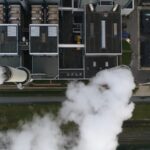The Guardian
Oil & Gas 360 Publishers Note: I found this as another interesting example of how strong the loyalties movement for the renewable markets can be. As an opinion piece from The Guardian, we like to post both sides to the discussion, and this has points on both sides of the fossil fuel debate I found interesting.
Former reality TV contestants promise ‘instant and long lasting hot water’ in campaign by gas company Jemena
The natural gas giant Jemena has defended paying Instagram influencers, including former contestants of The Block, Married at First Sight and other reality TV shows, to promote the fossil fuel in social media posts.

The #GoNaturalGas campaign from the Chinese and Singaporean-owned Jemena, which manages key natural gas pipelines around and out of Australia, appears to have been running for two years online, and comes amid concern liquified natural gas could be as bad for the environment as coal.
Among the posts, first reported by the industry news site Renew Economy, influencers spruik natural gas as a good source of energy for staying warm, for kitchen use and for better health.
Shannon and Simon Vos, the brothers who won season nine of The Block in 2014, are among several former reality TV stars to have taken part, advertising the #GoNaturalCampaign campaign to their 40,000 Instagram followers.
In an Instagram post from August 2018, the brothers said: “If you’ve got a reno or a new build coming up, hook up to a sleek little gas hot water system and you’ll have all the steamy showers whenever you want and for how ever long it takes to turn those toes all wrinkly.”
“We’ve got some hot tips for your bathroom build, and the dudes at GoNaturalGas.com.au have crunched the numbers and it seems that most of us want instant and long lasting hot water in our ideal homes. So take it from Simon (he’s a profeshimonal ) you can’t go past Gas…. #gonaturalgas,” the post said.
A now-deleted post from Catherine Heraghty, director of Sydney-based interior design company The Stables, suggested clients designing bathrooms should choose natural gas to ensure hot showers.
[contextly_sidebar id=”G3WfNWpLIg5OUy3KMEJrBPVPznp6mUnH”]
“In the cooler months of the year there is nothing like the warmth of a hot steamy shower after a cold winter’s day,” the post on The Stables’ Instagram account reportedly said to its 170,000 followers, before it was taken down.
“When we built our house we decided to hook up to natural gas so that we could enjoy instant hot water that never runs out. I suggest to all of my clients that they consider hooking up to natural gas when building or renovating, there is nothing worse than running out of hot water at the end of the day and having a cold shower (the worst!!) or washing the dishes in cold water!” it said.
Most of the paid posts appear to have been deleted after the publication of the Renew Economy article, with anti-natural gas posts warning “gas is a fossil fuel” and “gas ain’t cute” subsequently flooding out the feed for the hashtag #GoNaturalGas.
Heraghty’s post declared that it was part of a paid partnership with the #GoNaturalGas campaign, but the Vos brothers’ post – which the Guardian has learnt was a paid post – did not.
Roxy Jacenko, who represents Shannon and Simon Vos, said there was no legal requirement for the brothers to declare any paid partnership.
“This job dates back to August 2018 – at that time there was no legal requirement to note whether the posting was paid or not,” Jacenko said.
“As I understand, this is still not a legal requirement in Australia, it is up to the individual entirely.”
Heraghty did not respond to requests for comment
This week the Australian Influencer Marketing Council, a body launched in 2019, released the industry’s first code of practice for influencers in Australia, to provide guidelines for social media personalities on legal recommendations, vetting potential partner companies, contract considerations and disclosing partnerships. “Consistent, agreed transparency of paid engagements is key to supporting best practice and industry self-regulation,” the code says.
A Jemena spokesman told the Guardian: “We work with a variety of personalities to demonstrate the benefits of natural gas, which we know has less than half the carbon intensity of other fossil fuels, and, for many households, can significantly reduce their energy bills.
“At the same time, we’re investing millions of dollars in renewable gas research and development projects, as we work towards modifying our network to transport green gas in the near future.
“Taking this approach will save customers in the long-term as it will avoid millions of dollars in new infrastructure investment, while also avoiding putting increased pressure on the electricity network at peak times,” he said.
The Jemena spokesman did not address questions about any complaints it had received from the public about the campaign, or whether the company directed the influencers it worked with to take down their posts in the aftermath of media attention. He did not confirm if the company was continuing to pay social media users to promote natural gas.
The campaign comes as expert group Global Energy Monitor warned the liquefied natural gas industry will play at least as big a role as new coal investments in bringing on a climate crisis if all planned projects go ahead, a stance which appears to be at odds with comments by Australia’s emissions reduction minister, Angus Taylor, who has said the country could be proud that the rapidly expanding LNG export industry was displacing coal power overseas.
… to make a greener world. Covid-19 has delivered unusual environmental benefits: cleaner air, lower carbon emissions, a respite for wildlife. Now the big question is whether we can capitalise on this moment. The Guardian aims to lead the debate from the front.
In the weeks and months ahead, our journalism will investigate the prospects for a new green settlement. We will showcase the big thinkers and protagonists and amplify the arguments for authorities everywhere to consider as they lead us out of coronavirus.







